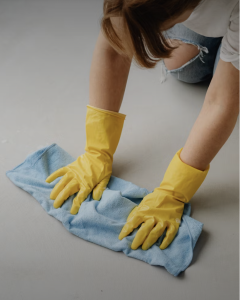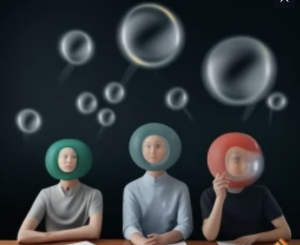Do you ever feel like you’re inclined to accept the blame when things go wrong? The truth is, some of us are more prone to feeling guilty, as if a background sense of guilt is just wired into our system. Even if we don’t know specifically what we did wrong, we’re convinced that we did something we shouldn’t have, something bad, which then created whatever problem now exists. Sometimes it’s a feeling of being wrong on a more fundamental level, not for anything specific, but wrong in our core, as if our very nature is at fault. When we’re accustomed to feeling guilty, we also tend to end up in loverelationships with people who agree with us; we find partners who share and encourage our belief that we’re to blame, which then further strengthens it.
How does this happen?
Some people are raised in homes where they are perpetually blamed for whatever goes wrong, whether or not they had a part in it. Usually, for a time, they fight back and continue to know themselves as innocent. They feel the injustice of the wrongful accusations. But as time goes on and the blaming continues, but the knowing of their innocence remains irrelevant or worse, an exacerbating factor, two things happen. First, these people learn to accept the blame for what they haven’t done, even when they know they’re innocent—because it actually feels helpful to take the blame and it often pleases those they need to keep happy, even if at the cost of their own rightness. But eventually, sadly, they come to experience themselves as guilty; the knowing of their innocence actually gets buried and the blame projected onto them becomes their truth. They become the bad one on the inside as well as the outside.
In other situations, when a child is neglected, abused, or abandoned, her way of explaining this mistreatment to herself is to blame herself for what happened. Mommy left because I was wrong and there is something fundamentally wrong about me. Mommy isn’t guilty, I am. I am to blame for daddy’s anger, even if I can’t know what I did to make it happen. Daddy isn’t guilty, I am. When we take the blame for mistreatment, we do what we most need to do, which is keep and hold mommy and daddy, internally, as the good ones. As painful and destructive as the system is, it has a wise purpose.
As young ones, it is less painful to make ourselves the bad one rather than to allow our parent (whom we desperately need) to be bad. More even than our own goodness, we rely on the belief in our parent’s goodness. So too, we rely on the world making sense. And so, heartbreakingly, we join our caretakers in believing our guilt, which then, ironically, puts the world back in order and sensibly explains their treatment of us. The cognitive dissonance that would arise from knowing our own goodness and at the same time being mistreated by those who are supposed to love and care for us, is too overwhelming to bear. And so we become internally wrong, which, paradoxically, makes the world understandable once again.
There are many varieties of early experiences that can create an instinct to assume blame, but in the interests of space, I will elaborate on only one other. Some of us grew up in families in which apologies or ownership for bad behavior never happened. When we expressed our upset, we were either informed of our crime, in other words, what we did that caused them to do what they did to us, thereby legitimizing their behavior and turning empathy for us into a moot point. Or, we were told how we had done or were wrong, in a more global sense, which then made us undeserving of any kind of treatment other than the kind we received.
For those of us raised in this environment, empathy for our experience was simply not available; we did not know the experience of someone hearing our upset and simply caring about it, taking responsibility for and validating it, without blaming us for it. We did not have the safety of knowing that our experience mattered no matter what it contained. All expressions of upset were met with a lesson in our own culpability in our suffering. The mantra in families like this is “Look at your own behavior…that’s what you never do!” As the recipient of this kind of blame we then come to believe the mantra, to think that we are somehow responsible, not just for the situation and our own suffering, but also for not being willing to take responsibility for our deserved guilt.
How to Heal?
So, how do we stop the cycle and heal the core belief that we are to blame? Can we free ourselves from the deep sense of fundamental guilt? How do we remove the Velcro inside ourselves to which any wrongness seeking a home will stick?
In my experience as a therapist and also as someone who has struggled with guilt, and who was trained early to look to myself for the cause of my own or another’s suffering, I can offer a few thoughts, which I hope are helpful.
To begin with, we have to unpack the original source and conditions for our assumption of blame, to navigate through the who, what, where, how, and why (carefully) of our being blamed, and also see what that created in us. Secondly, we need to bring compassion to our own experience, to open our heart to the suffering that comes with feeling always to blame, with having to play the role, and worse, believe the role of the bad one. So too, we need to notice where we started to agree with our accusers, and understand and forgivewhy we needed to do that to be okay, how the system of blame worked. This involves spending time unraveling our relationship with blame and guilt, and looking deep into our conditioning, and the making of our identity as the one who’s wrong. We do this with another human being: a therapist, counselor, spiritual teacher, friend, or anyone else who is fundamentally on our side, and can keep our eyes and heart open when we’re inclined to slip back into the darkness and pain of self-blame.
We also, in this process, need to separate outcome from intention. That is, we need to look through our lives and notice where we blamed ourselves or were blamed by others for an unwanted result, but without considering what we were trying to make happen—our intentions. Most of the time we’re doing our very best to make something good happen, but it doesn’t always work out that way. We can’t control outcomes, only intentions. Most of the time, blame is about having created a wrong outcome and yet it utterly ignores the intention that was mother to the process. In turning the light from results to our intentions, we re-train ourselves to connect with our goodness (which lives in intention). We befriend the part of ourselves that’s ignored when we’re being blamed or self-blaming.
As we go through this process, it’s also profoundly important that we examine our life now and identify the areas where we ourselves are adding to and creating our sense of blame and shame. Often, we engage in behaviors that initially alleviate our sense of guilt, but then end up fueling and justifying that guilt. For example, I recently worked with a woman who started drinking casually, in part to ease her sense of unshakeable (although non-specific) guilt. But over time, her drinking had become more secretive and frequent, which then gave her ever more reason to feel guilty and bad. The coping mechanism for our guilt becomes its cause. We need to be fierce and rigorous in our self-inventory, and most importantly, to terminate all those behaviors that in any way strengthen our underlying sense of being blame-worthy, or in any way contribute to a sense of self that forms a handshake with our earliest blamers.
And finally, and perhaps most importantly, breaking free from the assumption of blame relies upon having a different experience of ourselves in the world. When we put ourselves in the company of people who are kind and reliably on our side, who start (and end) from the belief that we’re good and our intentions are positive, who are willing to listen and care about how we are, even when it might not be what they want to hear… then, we learn to see ourselves through the lens of kindness and support we see in their eyes when they look at us. Miraculously, we come to know ourselves as innocent. When we consistently put ourselves in an environment of acceptance and love—the opposite of blame— surround ourselves with people who are fundamentally for and not against us, we then awaken to our truth, the one we knew a very long time ago, before it had to go away. We awaken and discover that our acceptance of guilt, of badness, is inherently unkind and unfair—to ourselves. We see ourselves, at last, as good.


